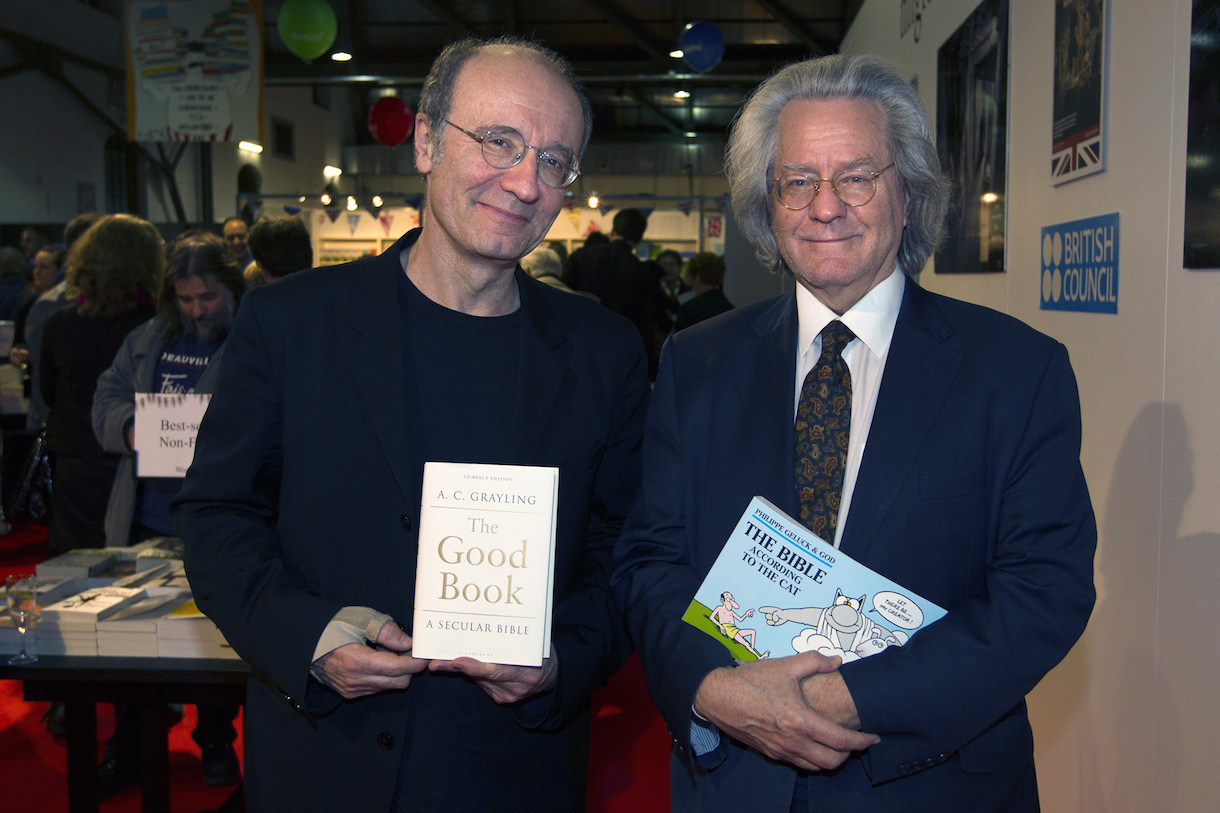 British philosopher Anthony Clifford Grayling (right) with cartoonist Philippe Geluck at the Brussels Book Fair in 2014. – AFP pic, October 31, 2015.British philosopher A.C. Grayling has penned more than 30 books tackling everything from happiness and friendship to humanism and freedom. In 2011, he founded the New College of Humanities, where he is master.
British philosopher Anthony Clifford Grayling (right) with cartoonist Philippe Geluck at the Brussels Book Fair in 2014. – AFP pic, October 31, 2015.British philosopher A.C. Grayling has penned more than 30 books tackling everything from happiness and friendship to humanism and freedom. In 2011, he founded the New College of Humanities, where he is master.
He spoke to AFP about how the failure of humans to choose a rational mindset over religious beliefs is creating our biggest challenges for survival, as well as the role of philosophy and the pursuit of happiness in modern life, ahead of his talk at the Hong Kong Literary Festival which opens today.
Q. What is the biggest challenge facing humans today?
A. The transition from religious to more rational mindsets is proving to be a painful and drawn-out one. Adherence to ancient dogmas and superstitions is too often a divisive and dangerous element in our world. We need free minds, rational and respectful of evidence and reason, and ethics based on human rights and humanistic attitudes.
Q. Is it possible for everyone on earth to be happy?
A. Yes. But while there is so much inequality, injustice, disparity in resources, and the artificial divisions of religion and political tribalism, this is going to be hard to achieve.
Q. As an atheist – do you feel the world would be a better place without religion?
A. I most emphatically think that the world would be a far, far better place without religion. There are various reasons why conflicts arise between people, but the single greatest one is religion: and given that religions are antique sets of superstitions and non-rational beliefs, it is a tragedy of the first order that they still cause such immense suffering and difficulty in the world.
Q. What role does philosophy play in the modern world?
A. Philosophical ideas and styles of thought have an enormous amount to offer the public conversation (on) questions of value and practice, political choices, the purpose and best methods of education and scientific enquiry, and much more. Philosophy should be a core part of the educational curriculum to make people more questioning, alert, with good skills of critical reasoning.
Q. Is the pursuit of happiness confused with acquisition of material things?
A. Yes this often happens. The old cliche that happiness cannot be bought is true, but it must also be acknowledged that certain kinds of possessions can contribute to happiness: A comfortable home with beautiful views, books and music, travel... these are things that have to be bought, and they certainly contribute to happiness.
Q. Arts, humanities, and literature – still relevant in a tech-driven world?
A. Arts, humanities and literature are explorations of the great conversations of humankind about all the things that matter most in life – our experience, relationships, social obligations and aspirations, our values, our interpretations of each other and the world. Without (them) we are deaf, blind, trapped in the present, with no sense of the great range of possibilities.
Q. Has the art of studying for knowledge, rather than for vocation been lost?
A. There is a danger that too many people will treat education as a mere means to a banausic end. Education is for the whole person, for life, for the enrichment and enhancement of experience, for the opening of windows through which to see the world aright.
Q. You've tackled religion, knowledge, happiness – what next?
A. I have just finished a book about the intellectual history of the 17th century, which is the period when the modern mind was forged. I am (also) writing a book about war, from the ethical point of view. – AFP/Relaxnews, October 31, 2015.

Comments
Please refrain from nicknames or comments of a racist, sexist, personal, vulgar or derogatory nature, or you may risk being blocked from commenting in our website. We encourage commenters to use their real names as their username. As comments are moderated, they may not appear immediately or even on the same day you posted them. We also reserve the right to delete off-topic comments